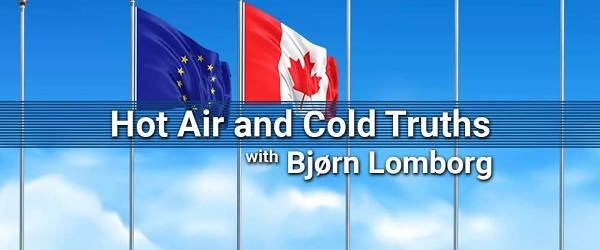2025 Federal Election
The status quo in Canadian politics isn’t sustainable for national unity

From Energy Now

William Lacey

The Willful Blindness of the East
That’s it. I’m officially a separatist…sort of. Really, I’m just completely tired of Ontario and Quebec. After 10 years of frozen economic output, a runaway immigration program, and a debt profile that went hyperbolic, Eastern Canada appears to have decided that another four years of the same old, same old is a good path forward.

In short, they think that the clown car that led this country, after just swapping out the driver (who happened to be one of the people who was supplying the directions), is a good idea.

Having been born and raised in Alberta, I feel that there is a significant amount of the battered spouse syndrome that is alive and well in the province, with people saying “I know the rest of the country love me. They’re just having a bad day.” No matter how many times I ask “what’s in this great union for Alberta” I get the same kitschy feedback. Be grateful for Canada and its social programs and “free” medical system (they are broken), Canada in the Great War (umm…that was 107+ years ago), great moments in sports, tidewater access (umm….that’s a quiet threat), etc. When it comes to one tangible answer, I just get silence. But the reality is that the East is perfectly happy to look down their noses, take the money, and then say “you are not one of us; you lack provenance!” Now some of you may say that is bullshit and that Albertans are an ungrateful bunch. But being someone who has lived in both the East and West, and worked with people who come from all walks, I know firsthand the bias exists.
Alberta, and the West, have made outsized contributions to confederation, much of that through the system that we call equalization. The idea behind this system was so that all parts of Canada get equal treatment through the taxation system, taking funds generated by “have” provinces and redistributing those funds to “have not” provinces, making sure that all are afforded the basics that Canadians have taken to be their definition of Canada. This is essentially done by looking at the fiscal capacity of each province, based on the average national tax rate, and then “balance” the books based on this average capacity. And that’s fine. But in the world I live in, when one group reaches out and helps the other, there is an acknowledgement of the effort, not a “va te faire foutre!” like comes out of Quebec. There is a certain irony from the chart below that it looks like Quebec is giving the finger to the rest of the country.

The reality is that the East views it as beneath them to say thank you for such a contribution. Moreover, many go out of their way to vilify the work that is done and to demean those who do it. So you wonder why the frustration mounts? The fact of the matter is that I believe that the Conservative movement has been codified out East as a fringe movement, only to be voted for when the Liberals need a brief time out.
Do I think separation is a real possibility? Not really. There are numerous challenges, some of which are more difficult than others. The largest one is probably related to indigenous matters, but they too likely suffer from a version of battered spouse syndrome. There is an underlying tenet that the Federal Government cares for them, but based on what I have seen, that is a unique “standard of care” that is being applied. I actually believe that better outcome for the indigenous people could be achieved under a new relationship, assuming both sides were open minded.
Now before you say “you are on the fringe, you don’t represent the masses”, I can tell you that I know a lot of people who are leaders in their professions within this province, whether that is health, law, business, etc. that all echo these feelings. The frustration is palpable, it is real and it is broader than you think.
So, with this I finally raise my hand and make the call that “I’m tired of the relationship I am in.” This pains and saddens me deeply, as I am someone who has worn the maple leaf with great pride and who has been happy to pronounce “I am Canadian.” I think it’s time to reconsider who I view as my partner.
2025 Federal Election
I don’t believe these polls!

 Dan McTeague
Dan McTeague
Cards on the table, I’m skeptical of the current state of the polling in this election. My sense is that Mark Carney and the Liberals’ numbers are, at least in part, a byproduct of sympathetic pollsters over-sampling their key demographics, and those being trumpeted to high heaven by the publicly-funded media. That, coupled with voters’ justifiable annoyance at Donald Trump’s “51st State” cracks and tariff threats, has contributed to an illusion of enthusiasm, a sense that they are running away with this thing.
That said, one polling data point has struck me as being both real and important. A recent Abacus Data poll showed that, when you cut out all the distractions, Canadians’ biggest concern remains our inflated cost of living. And that is an issue which clearly favors Poilievre and the Conservatives.
That’s because the dire state of our economy can largely be laid at the feet of the Liberals, who’ve been running the show for the past decade. Yes, they’ve made a change at the top, but not much of one. On top of being a globe-trotting member of the “Green” Elite, and champion of environmentalist banking, Mark Carney was a Liberal advisor for years, a key part of the Trudeau “brain trust” — trust me, I use that term loosely — that cooked up a whole raft of economy smothering “Green” policies which have done nothing to reduce global carbon emissions, but have succeeded in lightening our wallets.
Under Trudeau, our annual GDP growth noticeably shifted from the 3% range towards the end of the Harper years to the 1% range more recently. Household debt-to-income ratios rose steadily in the same period, while real household spending per capita dropped 2-3% below 2019 levels by 2024, as costs and interest rates went up. Disposable income growth has been outpaced by inflation and taxes, and bankruptcy filings have risen 40% since just 2019.
Canadian food prices have exploded by 35-40%, with family spending up over 50% over the past decade. Consequently, food insecurity rose to 23% by 2023, from around 8% in 2015, and Food Banks Canada has reported a 78% surge in usage from 2019 to 2023.
Meanwhile, Canada’s national debt, which was just over $600 billion when Justin Trudeau was handed the federal credit card, has roughly doubled, reaching over $1.2 trillion by the time he left. And provincial debt has risen by about $1 trillion in the same period.
It’s a frightening financial snapshot. And many of these negatives can be attributed to the Liberals’ war on oil and gas, which remains — however much Carney might wish otherwise — the backbone of our national economy.
So much of the Liberals’ time and effort in government has been spent kneecapping the resource sector, and for purely ideological reasons. From Bill C-48, the Oil Tanker Moratorium Act of 2019, which significantly reduces our ability to sell oil and gas abroad, to Bill C-69, which added mountains of red tape for infrastructure projects, so much so that it was nicknamed the “No More Pipelines” Act.
You’ll remember that the Supreme Court ruled the “No More Pipelines” act largely unconstitutional two years ago. Even so, Carney recently said he has no intention of repealing it, prompting Poilievre to tweet out, “This Liberal law blocked BILLIONS of dollars of investment in oil & gas projects, pipelines, LNG plants, mines, and so much more,” with an excellent infographic attached, listing the various cancelled energy projects throughout Canada since the Liberals came to power.
And then of course, there’s the Consumer Carbon Tax, which started out at $20 per tonne of CO2 emitted in 2019, small enough that many Canadians barely noticed they were paying it, but increased every year until it hit $80 per tonne.
By that point it became so noticeable and unpopular that the Liberals felt they had no choice but to “cancel” it (“zero it out” is more accurate), before it could reach the $170 by 2030 which they’d planned. Still, it remains on the books, ready to be raised again, without a vote, if Carney so chooses.
Even if he doesn’t, Carney has doubled down on the Industrial Carbon Tax. While the Liberals claim this is an improvement because it isn’t paid by working Canadians, only by big evil “polluters.” Of course, they said something similar about the Consumer Tax, that by some financial wizardry, we regular folks would get back more than we paid in, which turned out to be total bunk.
Meanwhile, the Industrial Tax makes our lives more expensive in essentially the same way as the Consumer Tax. It raises the cost of doing business, of heating our homes, of filling up our car, of our grocery bills. It just does so by a less direct route, by taxing businesses instead of individuals, so that we pay when the price of goods and services goes up in response.
The Industrial Carbon Tax, much like Trudeau’s Clean Fuel Regulations, is ultimately a hidden tax, and that suits Carney just fine. He’d prefer that we not know who to blame as our cost of living skyrockets.
The Liberal Party’s economic record over since 2015 has been atrocious, and it will be no different under Mark Carney. He is complicit, and he continues to support policies which would make us poorer, like Bill S-243, the “Climate-Aligned Finance Act,” which Carney testified before the Senate in support of last year. That bill sought to make it nearly impossible for banks to invest in, or loan money to, oil and gas projects in Canada, and tried to force financial institutions to appoint board members ideologically opposed to fossil fuels.
Canada needs to change course, and soon. As things stand, it will be tough for even a good captain to navigate us through the rough seas the Liberals have steered us into over the past ten years. A few more, and with Mark Carney at the helm, might make that impossible.
Dan McTeague is President of Canadians for Affordable Energy.
Support Dan’s Work to Keep Canadian Energy Affordable!
Canadians for Affordable Energy is run by Dan McTeague, former MP and founder of Gas Wizard. We stand up and fight for more affordable energy.
2025 Federal Election
Don’t double-down on net zero again

From the Fraser Institute
In the preamble to the Paris Agreement, world leaders loftily declared they would keep temperature rises “well below 2°C” and perhaps even under 1.5°C. That was never on the cards—it would have required the world’s economies to effectively come to a grinding halt.
The truth is that the “net zero” green agenda, based on massive subsidies and expensive legislation, will likely cost more than CAD$38 trillion per year across the century, making it utterly unattractive to voters in almost every nation on Earth.
When President Trump withdrew the United States from the Paris Climate Agreement for the first time in 2017, then-Canadian Prime Minister Justin Trudeau was quick to claim the moral high ground, declaring that “we will continue to work with our domestic and international partners to drive progress on one of the greatest challenges we face as a world.”
Trudeau has now been swept from the stage. On his first day back in office, President Trump signed an executive order that again begins the formal, twelve-month-long process of withdrawing the United States from the Paris Agreement.
It will be tempting for Canada to step anew into the void left by the United States. But if the goal is to make effective climate policy, whoever is Canada’s prime minister needs to avoid empty virtue signaling. It would be easy for Canada to declare again that it’ll form a “coalition of the willing” with Europe. The truth is that, just like last time, that approach would do next to nothing for the planet.
Climate summits have generated vast amounts of attention and breathless reporting giving the impression that they are crucial to the planet’s survival. Scratch the surface, and the results are far less impressive. In 2021, the world promised to phase-down coal. Since then, global coal consumption has only gone up. Virtually every summit has promised to cut emissions but they’ve increased almost every single year, and 2024 reached a new high.
Way before the Paris Agreement was inked, the Kyoto Protocol was once sold as a key part of the solution to global warming. Yet studies show it achieved virtually nothing for climate change.
In the preamble to the Paris Agreement, world leaders loftily declared they would keep temperature rises “well below 2°C” and perhaps even under 1.5°C. That was never on the cards—it would have required the world’s economies to effectively come to a grinding halt.
The truth is that the “net zero” green agenda, based on massive subsidies and expensive legislation, will likely cost more than CAD$38 trillion per year across the century, making it utterly unattractive to voters in almost every nation on Earth.
The awkward reality is that emissions from Canada, the EU, and other countries pursuing climate policies matter little in the 21st century. Canada likely only makes up about 1.5 per cent of the world’s emissions. Add together Canada’s output with that of every single country of the rich-world OECD, and this only makes up about one-fifth of global emissions this century, using the United Nations’ ‘middle of the road’ forecast. The other four-fifths of emissions come mostly from China, India and Africa.
Even if wealthy countries like Canada impoverish themselves, the result is tiny — run the UN’s standard climate model with and without Canada going net-zero in 2050, and the difference is immeasurable even in 2100. Moreover, much of the production and emissions just move to the Global South—and even less is achieved.

One good example of this is the United Kingdom, which—like Prime Minister Trudeau once did—has leaned into climate policies, suggesting it would lead the efforts for strong climate agreements. British families are paying a heavy price for their government going farther than almost any other in pursuing the climate agenda: just the inflation-adjusted electricity price, weighted across households and industry, has tripled from 2003 to 2023, mostly because of climate policies. This need not have been so: the US electricity price has remained almost unchanged over the same period.
The effect on families is devastating. Had prices stayed at 2003 levels, an average family-of-four would now be spending CAD$3,380 on electricity—which includes indirect industry costs. Instead, it now pays $9,740 per year.
Rising electricity costs make investment less attractive: European businesses pay triple US electricity costs, and nearly two-thirds of European companies say energy prices are now a major impediment to investment.
The Paris Treaty approach is fundamentally flawed. Carbon emissions continue to grow because cheap, reliable power, mostly from fossil fuels, drives economic growth. Wealthy countries like Canada, the US, and European Union members have started to cut emissions—often by shifting production elsewhere—but the rest of the world remains focused on eradicating poverty.
Poor countries will rightly reject making carbon cuts unless there is a huge flow of “climate aid” from rich nations, and want trillions of US dollars per year. That won’t happen. The new US government will not pay, and the other rich countries cannot foot the bill alone.
Without these huge transfers of wealth, China, India and many other developing countries will disavow expensive climate policies, too. This potentially leaves a rag-tag group led by a few Western European progressive nations, which can scarcely afford their own policies and have no ability to pay off everyone else.
When the United States withdrew from the Paris Agreement in 2017, Canada’s doubling down on the Paris Treaty sent the signal that it would be worthwhile spending hundreds of trillions of dollars to make no real difference to temperatures. We fool ourselves if we pretend that doing so for a second time will help the planet.
We need to realize that fixing climate change isn’t about sanctimonious summits, lofty speeches, and bluster. In coming weeks I’ll outline the case for efficient policies like innovation, adaptation and prosperity.
-

 2025 Federal Election14 hours ago
2025 Federal Election14 hours agoLiberals Replace Candidate Embroiled in Election Interference Scandal with Board Member of School Flagged in Canada’s Election Interference Inquiry
-

 Alberta13 hours ago
Alberta13 hours agoIs Canada’s Federation Fair?
-

 Alberta12 hours ago
Alberta12 hours agoProvince introducing “Patient-Focused Funding Model” to fund acute care in Alberta
-

 espionage15 hours ago
espionage15 hours agoU.S. Experts Warn Canada Is Losing the Fight Against PRC Criminal Networks—Washington Has Run Out of Patience
-

 Alberta8 hours ago
Alberta8 hours agoMedical regulator stops short of revoking license of Alberta doctor skeptic of COVID vaccine
-

 Automotive16 hours ago
Automotive16 hours agoTesla Vandals Keep Running Into The Same Problem … Cameras
-

 International9 hours ago
International9 hours agoUN committee urges Canada to repeal euthanasia for non-terminally ill patients
-

 COVID-192 hours ago
COVID-192 hours agoMassive new study links COVID jabs to higher risk of myocarditis, stroke, artery disease



